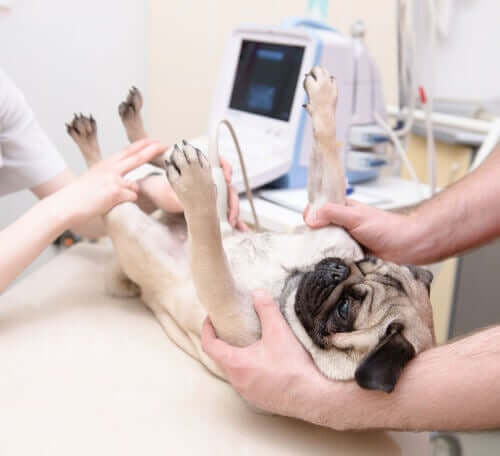Causes of Miscarriage in Dogs


Written and verified by the biotechnologist Alejandro Rodríguez
The arrival of a new dog into the home is undoubtedly a cause to celebrate, but it’s also important to make sure that the mother’s pregnancy goes as smoothly as possible. Sometimes, unforeseen events can sadly trigger a miscarriage in dogs.
Miscarriage in dogs: timing is important
Pregnancy (which takes between 63 and 67 days) is one of the most delicate times for a dog. During this time, there’s a complex balance at a physical, hormonal and nutritional level so that the embryo can develop and grow.
However, at any time during the pregnancy, something can, unfortunately, go wrong. The effect of this on the mother or the puppy can be determined by when this happens. Generally, miscarriages in dogs that happen before the fifth week are normally due to possible infertility.
In these cases, the undeveloped embryos become reabsorbed. There are no negative consequences for the mother and it can even go unnoticed. However, miscarriages in dogs from the fifth week of pregnancy onwards can cause problems since they’re painful and harder to cope with on all levels.

What are the most common causes of miscarriage?
As we already mentioned, there are many factors that need to be kept under control during a dog’s pregnancy. The slightest imbalance in any one of them could trigger a miscarriage, especially during the last weeks of pregnancy. One important factor relates to the dog’s hormones. If one hormone, such as progesterone, is not kept in balance, this can lead to practically irreversible changes.
There are also some medications that can negatively affect the puppy’s development. So, if you need to administer any medication, you should do this under the strict supervision of a vet.
Miscarriage in dogs can also have a microbial cause. Some bacteria (such as Brucella or Listeria, among others) can cause irreversible disorders that ultimately lead to a miscarriage. Other microorganisms can appear in places such as their food or water, so monitoring your dog’s diet is essential.
Finally, there are some ‘internal’ factors that can negatively influence a dog’s pregnancy. Perhaps the most important one is age, since pregnancies become riskier as your dog gets older.
Symptoms of miscarriage in dogs
It’s not always easy to detect that something might be wrong with your dog’s pregnancy. This is mainly because the possible symptoms can be quite nonspecific, such as:
- Abdominal pain
- Fever
- Vomiting and diarrhea
- Loss of appetite and apathy

Other symptoms such as heavy bleeding or abnormal vaginal discharge are more obvious and you should go straight to the vet if you notice them. Once the vet has made a diagnosis, you can find out the steps to follow and try to identify the possible cause.
If a miscarriage does, sadly, take place, it’s important to focus all your attention and affection on your dog. She will probably be depressed and tired. But if all goes well, with your help, your dog will be able to recover and be the same as they were before.
The arrival of a new dog into the home is undoubtedly a cause to celebrate, but it’s also important to make sure that the mother’s pregnancy goes as smoothly as possible. Sometimes, unforeseen events can sadly trigger a miscarriage in dogs.
Miscarriage in dogs: timing is important
Pregnancy (which takes between 63 and 67 days) is one of the most delicate times for a dog. During this time, there’s a complex balance at a physical, hormonal and nutritional level so that the embryo can develop and grow.
However, at any time during the pregnancy, something can, unfortunately, go wrong. The effect of this on the mother or the puppy can be determined by when this happens. Generally, miscarriages in dogs that happen before the fifth week are normally due to possible infertility.
In these cases, the undeveloped embryos become reabsorbed. There are no negative consequences for the mother and it can even go unnoticed. However, miscarriages in dogs from the fifth week of pregnancy onwards can cause problems since they’re painful and harder to cope with on all levels.

What are the most common causes of miscarriage?
As we already mentioned, there are many factors that need to be kept under control during a dog’s pregnancy. The slightest imbalance in any one of them could trigger a miscarriage, especially during the last weeks of pregnancy. One important factor relates to the dog’s hormones. If one hormone, such as progesterone, is not kept in balance, this can lead to practically irreversible changes.
There are also some medications that can negatively affect the puppy’s development. So, if you need to administer any medication, you should do this under the strict supervision of a vet.
Miscarriage in dogs can also have a microbial cause. Some bacteria (such as Brucella or Listeria, among others) can cause irreversible disorders that ultimately lead to a miscarriage. Other microorganisms can appear in places such as their food or water, so monitoring your dog’s diet is essential.
Finally, there are some ‘internal’ factors that can negatively influence a dog’s pregnancy. Perhaps the most important one is age, since pregnancies become riskier as your dog gets older.
Symptoms of miscarriage in dogs
It’s not always easy to detect that something might be wrong with your dog’s pregnancy. This is mainly because the possible symptoms can be quite nonspecific, such as:
- Abdominal pain
- Fever
- Vomiting and diarrhea
- Loss of appetite and apathy

Other symptoms such as heavy bleeding or abnormal vaginal discharge are more obvious and you should go straight to the vet if you notice them. Once the vet has made a diagnosis, you can find out the steps to follow and try to identify the possible cause.
If a miscarriage does, sadly, take place, it’s important to focus all your attention and affection on your dog. She will probably be depressed and tired. But if all goes well, with your help, your dog will be able to recover and be the same as they were before.
All cited sources were thoroughly reviewed by our team to ensure their quality, reliability, currency, and validity. The bibliography of this article was considered reliable and of academic or scientific accuracy.
- Schlafer, D. H. (2008). Canine and feline abortion diagnostics. Theriogenology, 70(3), 327-331.
- Hollett, R. B. (2006). Canine brucellosis: outbreaks and compliance. Theriogenology, 66(3), 575-587.
This text is provided for informational purposes only and does not replace consultation with a professional. If in doubt, consult your specialist.








